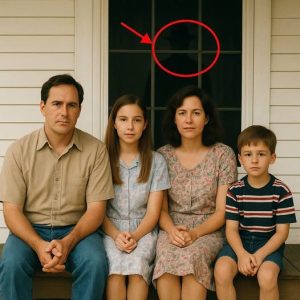An Elderly Mother Pretended to Be Mentally Ill to Test Her Children’s Love — Five Years Later, the Truth She Discovered Broke Her Heart
Margaret Thompson had just turned seventy-two. Her husband had passed away more than two decades ago, leaving her alone to raise their three children in Ohio. She worked tirelessly, took extra shifts, and sacrificed every comfort to make sure her children could go to college and have a better life than she did.
Now, all three were successful. Richard, the eldest, was a real estate agent living in Chicago with a big house and two cars. Susan, the middle child, had her own family in Dallas, always busy with her kids. Daniel, the youngest, worked for a tech company in New York and was constantly “on business trips.”
But as their lives prospered, their visits grew fewer. The calls became shorter.
One winter night, Margaret caught a cold. Her hands trembled as she dialed Richard’s number.
“Mom, I’m in a meeting,” he sighed. “Call an Uber to the hospital. I’ll send money later.”
When she tried Susan, the reply came quickly,
“Oh, Mom, the twins are sick, and Tom’s out of town. I’ll call you tomorrow.”
And Daniel? He didn’t even answer.
That night, Margaret sat alone in her dim kitchen. The ticking of the clock was the only sound. She looked up at her late husband’s photo and whispered through her tears,
“They’re grown now, but they’ve forgotten who stayed awake with them every night. Maybe… maybe I’m the fool for expecting too much.”
A strange thought crossed her mind. What if I lost my mind one day? Would they still love me — or just throw me away?
The next morning, she began her plan.
She started pretending to forget things — misplacing her keys, confusing breakfast with dinner, calling Richard by her late husband’s name. Once, she even stood in the middle of the street as if she didn’t know where she was.
Within a week, the rumor spread through the family: Mom’s losing her mind.
The three children flew home — but not to comfort her.
Richard was the first to speak.
“Mom’s memory is going. It’s not safe for her to live alone. We should find her a care facility.”
Susan nodded quickly.
“Yes, it’s for her own good. Besides, I can’t take her in — the kids take up all my time.”
Daniel sighed, pretending to sound reasonable.
“We can split the cost. I’ll transfer some money each month. It’s the best option.”
Margaret sat quietly, eyes lowered. The decision was made. No one asked what she wanted.
A week later, she was moved into Maplewood Senior Care Center, a clean but lonely place. She told herself it was temporary. She watched the door every day, waiting for one of her children to visit.
But months passed, and the door never opened.
Sometimes Susan would stop by, leaving after fifteen minutes. The boys rarely came. On her birthday, no one called.
At night, Margaret lay in bed, listening to the rain against the window. She whispered to herself,
“I only wanted to know if they loved me. Now I know… and it hurts more than being alone.”
Five years slipped away. Her hair turned silver. The nurses adored her gentle smile, but inside, she was fading.
Then one morning, the doctor delivered devastating news:

“…Mrs. Thompson,” the doctor said softly, sitting at the edge of her bed, “your heart is very weak. I’m afraid we don’t have much time left — maybe a few months, at most.”
Margaret nodded slowly. There was no fear in her eyes, only an old, quiet sadness. “Thank you, Doctor,” she whispered. “You’ve all been very kind to me.”
That night, she asked one of the nurses to help her write three letters — one for each child. Each envelope was sealed carefully and placed in her bedside drawer, to be mailed only after she was gone.
Three months later, on a peaceful spring morning, Margaret Thompson passed away in her sleep.
When the news reached her children, guilt hit them like thunder. They arrived at the care home too late — the bed was empty, the sheets neatly folded.
The nurse handed them the three envelopes. “She asked me to give these to you.”
Richard opened his first. Inside was a letter written in shaky but graceful handwriting:
“My dear Richard,
You were always my pride — smart, determined, and brave. I never wanted to burden you. I only pretended to be ill because I wanted to know if the hearts I raised still remembered the warmth of home. Don’t be angry — a mother’s foolish test came from love, not doubt.
Be good to your own children. One day, they’ll test you the same way.
— Mom.”
Susan’s hands trembled as she read hers:
“My sweet girl,
You once held my hand and said you’d never let me grow old alone. But life changes, I know. You have your family now — I’m happy you do. I only wish I could’ve held my grandchildren one more time.
Don’t let busyness steal your heart the way it stole mine.
— Mom.”
Daniel’s letter was the shortest:
“My little boy,
You were my laughter when your father passed. I watched you grow, believing love was enough to hold us together. Maybe I was wrong — or maybe I just asked for too much.
I forgive you. Always.
— Mom.”
When they finished reading, none of them could speak. The silence in that small room was heavier than any words.
Richard broke down first. “We put her here,” he whispered. “And she died thinking we didn’t care.”
The nurse, tears in her eyes, pointed to the corner of the room. “She never stopped waiting for you. Every day at 5 p.m., she’d sit by that window and watch the parking lot. She always said, ‘Maybe today my boys and my girl will come.’”
That night, the three siblings returned to their mother’s old house. The furniture was covered in white sheets, dust floating in the sunlight. On the kitchen wall still hung a faded family photo — their mother’s smile bright and full of life.
They stood there for a long time, and for the first time in years, spoke honestly.
“We were so busy living,” Susan said through tears, “we forgot the one who gave us life.”
Richard nodded. “She tested our love… and we failed.”
Daniel whispered, “Maybe it’s not too late to pass her lesson on.”
And so, they kept the house — not to sell or rent, but to restore it. Every year on her birthday, they gathered there, cooked her favorite meal, and left a chair by the window — empty, but waiting.
Because love, once neglected, can’t always be repaid…
but it can be remembered.





